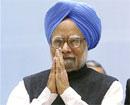
New Delhi, June 28: Alarmed over the state of economy and low morale of India Inc, Prime Minister Manmohan Singh on Wednesday asked the finance ministry officials to take steps to “reverse the climate of pessimism and give a push to sagging economy.”
Addressing a meeting of the senior officials of the ministry and policy makers for the first time after taking charge of the finance ministry, Singh remarked that there was a need to revive investors’ sentiment.
“At the current juncture, we are passing through challenging times economically. The growth rate has taken a dip; the industrial performance is not satisfactory; things are not rosy on the investment front; inflation continues to be a problem,” he said.
Singh, who has taken charge of the ministry following the resignation of Pranab Mukherjee, stressed the need to “revive the animal spirit in the country's economy."
"Immediate emphasis is to manage balance of payment, for which all policies should be directed to help institutional flows to India," he said adding "in the short run, we need to revive investor sentiment".
He expressed concern over the way the rupee was getting weaker by the day. Investor sentiment is down and capital flows are drying up, he added.
“There are some external reasons and we need to work towards making our country resilient in meeting these external challenges. However, there are many domestic reasons as well. We need to address these quickly.”
“The way it (finance ministry) functions is critical for the future of millions of our countrymen who look up to the government to throw open channels for their progress, prosperity and welfare. Therefore, it has a vital role in evolving economic policies.”
Chief Economic Adviser, Kaushik Basu, Principal Secretary to PM Pulok Chatterjee, secretaries in the Finance Ministry, R Gopalan, R S Gujral, Sumit Bose, D K Mittal and Mohmd Haleem Khan were present at the meeting.





Comments
Add new comment